Novartis makes acquisition; eyes more
Through the acquisition Novartis will gain 140 of Nektar’s staff, the product formulation and delivery expertise they provide and a broad device platform.
Novartis has stated it plans to use this expertise to formulate treatments for chronic obstructive pulmonary disease (COPD), asthma and cystic fibrosis. It will also be used in the life-cycle management of late-stage development projects.
Joe Jimenez, CEO of Novartis Pharma, said: "Severe respiratory diseases are a leading cause of mortality around the world and remain a significant unmet medical need.
"Through our existing collaborations, we have a high regard for the Nektar team and for their technologies, and these capabilities will play an important role in developing our respiratory pipeline."
Nektar will retain ownership to two of its programmes currently in clinical development and royalties generated by Ciprofloxacin inhaled powder (CIP).
The company will also keep the intellectual property related to inhaled insulin, which had been the big hope of its pulmonary drug delivery business before the collapse of Exubera.
Damage caused by Pfizer’s pulling of Exubera has been softened by the rise in Nektar’s PEGylation business, which the company is now going to put considerable efforts into.
Howard Robin, Nektar’s CEO, said: "This agreement will allow us to focus our efforts on the development of novel therapeutics using our PEGylation and conjugate chemistry-based drug development platforms.”
More to come?
Following a successful third quarter, in which Novartis posted an increase in net profits of 32 per cent, CEO Daniel Vasella told Bloomberg that the company was in a position to make further acquisitions.
Despite its $11bn acquisition of a stake in Alcon the company has a strong cash flow, which could be used to buy biotechs struggling to receive funding in the current economic climate.
A recent Datamonitor report predicted that the abrupt loss of cheap debt would hit small biotechs hard. These companies’ lifeblood is a ready access to capital and funding, which has dried up as the economic turmoil has unfolded.
By avoiding cheap debt remaining cash rich pharmaceutical companies have put themselves in a strong position to capitalise on the current lack of funding for biotechs.
This shift in power towards pharmaceutical companies should allow them to make acquisitions for less than was previously possible.
With big pharma still concerned about the strength of their pipelines it seems likely that companies other than Novartis are also eyeing biotech bargains.















